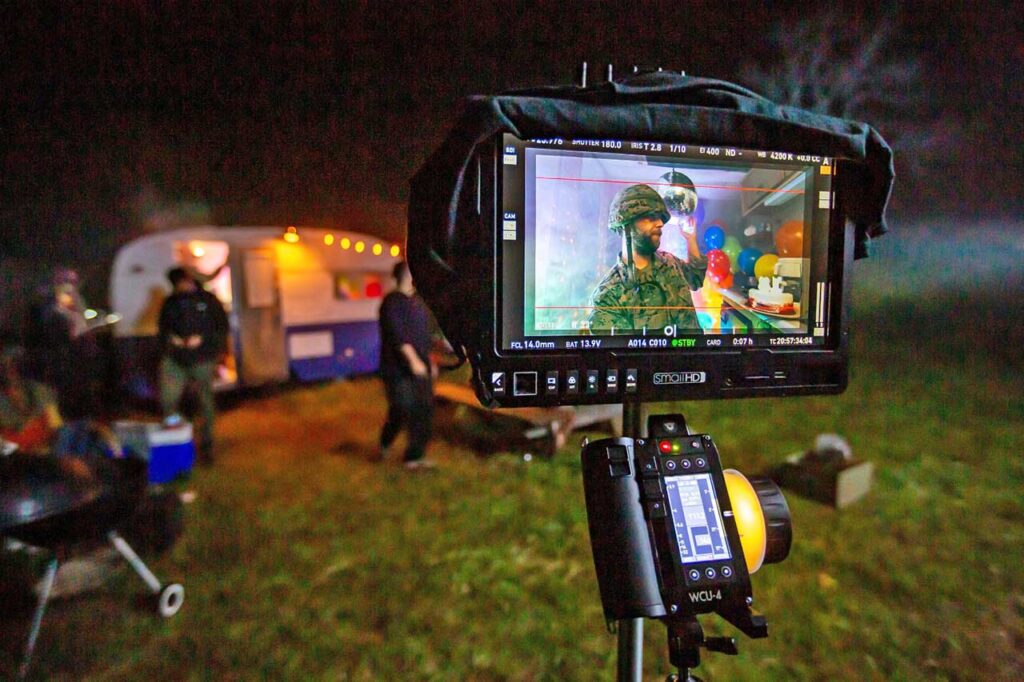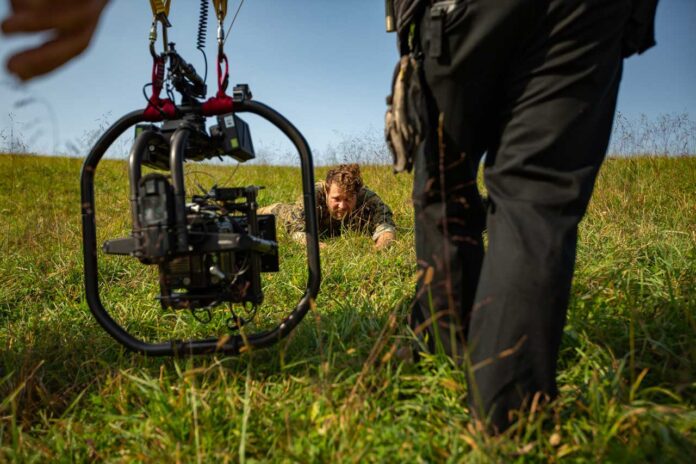James Darrah’s career exists at the intersection of his training in film and media and his passion for classical music. In recent years, the bisexual director has forged an enduring creative relationship with Opera Philadelphia, helming productions such as “Breaking the Waves” (2016), “Ne Quittez Pas” (2018) and “Semele” (2019). The partnership continues with “Soldier Songs,” a digital offering for Opera Philadelphia’s streaming platform that begins airing on Jan. 22. Darrah acted as co-screenwriter and producer alongside soloist/director Johnathan McCullough, and assisted in the project’s filming at the Brandywine Conservancy in Chester County. Speaking by phone from his home in Los Angeles, Darrah told PGN about his introduction to the opera world, the ongoing pivot from live to filmed performances, and his hopes for further innovation in the classical industry.
Did you always envision yourself working in classical music, or was that something that naturally evolved over the course of your career?
I went to a theater and film school, but I had always been interested in music. I ended up working in opera when I was getting an MFA, and I met certain people who gave me opportunities to direct opera when I was young. It really captivated me. There’s a lot about design and the integration with music, the spectacle of it, that I felt really drawn to. I’ve spent the last few years exploring that in some sense, while also always wanting to keep my hand in film and theater, and think about how that can influence my work in the genre too.
You’ve worked quite a bit with Opera Philadelphia over the past five years. How did that relationship develop?
I have a lot of interest in new work, so I’ve directed a lot of world premieres and contemporary compositions, and I know some composers. I’d heard the LA Philharmonic perform a piece by Missy Mazzoli, and then I introduced myself to her. I found out she was writing an opera of “Breaking the Waves,” and through conversations with her and [Opera Philadelphia], I pitched a production. I’ve come to feel like Opera Philadelphia is an artistic home in some ways. They are never interested in an artist just being narrowly defined. They’re more interested in projects that an artist might want to test — my first experience there was a world premiere, and then they had me back to do a Handel opera, which is completely on the other end of the spectrum. And “Soldier Songs” has allowed me to function more in a producer role, as well as writing and helping Johnathan as he makes his directorial debut. I like the idea that my relationship with the company isn’t a stagnant thing.
Was “Soldier Songs” originally planned for the stage, or was it specifically created with streaming in mind?
Johnathan McCollough created the project as a staged performance, and I actually came into it after the pandemic started, when Opera Philadelphia was looking at options for how to pivot toward something in digital media. I’ve been advocating for several years — and Philadelphia is one of the companies that really heard me — that opera should embrace some of the artistic capabilities of cinema more. I felt strongly that rather than create a staged performance that we’d then film, which is basically what we see a lot, we should be trying something different. At the end of the day, I think those things are great in a sense, but they don’t necessarily reach people who aren’t already invested in opera. I like that Philadelphia looked at it and said, what if we have seasons that have both cinematic explorations and live experiences? “Soldier Songs” is kind of the result of that push.
What was the experience of filming on location like?
It was strange, because there were a lot of firsts. Pre-pandemic, I had actually filmed [with Opera Philadelphia] Poulenc’s “La voix humaine” with Patricia Racette as an art film, which is still in post-production. There’s a lot of things we discovered in that process about how to film opera live in a convincing way, and what it’s capable of on camera, set up and shot like a real film. We used some of that knowledge, but it was also all during the pandemic, when we’re confronted with new regulations. We filmed in Pennsylvania, and I live in Los Angeles, so we had to do that in a safe way — I had to isolate and get tested when I flew in. Luckily, the concept of the piece meant that it was primarily an outdoor film shoot, which enabled us to be safe in that regard. It was definitely an interesting experience because you’re breaking lots of barriers. How do you coordinate a film shoot with a baritone, singing live, with pandemic restrictions, with opera personnel who haven’t necessarily ever worked on a film set?

Do you think the industry right now is at a point of no return, where more companies need to get on board with how they use nontraditional tools like digital media to move the art form forward?
I definitely think so. Physical opera is such a big, massive, unwieldy art form. Digital media can generate content at a faster and easier rate, if you have creative thinking behind it and are hiring people to make new work. I’m always advocating for opera to wake up and look around. Look what’s happening in our world. We’re undergoing massive paradigm shifts in many ways, and the ways we think about the world are changing. Especially in the pandemic, burying your head in the sand and waiting to resume business as usual just seems totally tone deaf to me. There’s a way to stop thinking about digital media offerings as just publicity. There’s always a tendency to think of new music, or a project like “Soldier Songs,” as a fringe offering. But Philadelphia has actually gone the opposite direction, to say that we believe in this as the future of the form. I think for most audiences — especially audiences who haven’t thought to give opera the time of day — that is the way in.
“Soldier Songs” premieres Jan. 22 on the Opera Philadelphia Channel (operaphila.tv) and will be available to stream through May 31.
